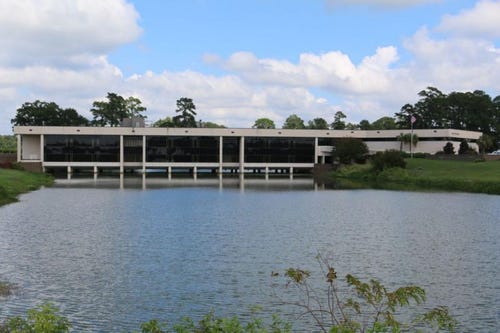September 26, 2016

Pee Dee region farmers and dignitaries from across South Carolina got a firsthand look at a $7 million renovation of Clemson University’s John B. Pitner Center in Florence on Sept. 13.
A ribbon cutting ceremony for the newly renovated center was held following the 2016 Field Day at the Pee Dee Research and Education Center. The Pitner Center, first opened in 1985, is the laboratory and administrative space for the center. The renovation includes new labs for the Advanced Plant Technology program, a stronger network for data transfer and more collaborative workspaces.
The field day drew a crowd of 291. Clemson University President James Clements and South Carolina Commissioner of Agriculture Hugh Weathers spoke and were on hand for the ribbon cutting.
Clements said the Pitner Center’s cutting-edge equipment and labs will allow Clemson to continue fulfilling its land-grant mission of delivering research-based discoveries to the citizens of South Carolina and is in step with founder Thomas Green Clemson’s vision for the university.
“When Thomas Green Clemson wrote his will to establish the university, it specifically said we should never forget to create an agricultural school that would help lead the state and its people toward more economic prosperity and a positive future. I am proud to see that his legacy is being fulfilled at such an amazing research center,” Clements said.
“The researchers here at the Pee Dee REC will be able to more quickly develop crops with improved resistance to drought, disease and pests, and this research will have an impact here in the Pee Dee and beyond. The renovation will also allow the Pee Dee REC to hire more specialists in soil health, peanut and soybean breeding and molecular biology,” Clements said.
It can take seven to 10 years to create new drought- and pest-resistant plant varieties, but the Pitner Center’s latest technology will allow Pee Dee REC scientists to identify favorable genetic markers in plants without having to wait for plants to reach maturity, which will accelerate the plant breeding process dramatically.
The Pee Dee REC is also hiring more specialists and updating programing to better serve South Carolina’s $41.7 billion agriculture and forestry industry.
“We as farmers can’t do the research to figure out what crops will perform best. We rely on Clemson to do that research for us. With this new facility we really think we will have some great research coming from here to help South Carolina agriculture,” said Keith Allen, farmer and Pee Dee District Farm Bureau vice president.
Allen said Clemson researchers already communicate research results to farmers through digital digests, websites and emails.
“Clemson entomologist Jeremy Greene sends out a weekly email telling us about the number of pests in soybeans and cotton and what we need to be doing to protect our crops. We get emails telling us about the soybean rust and what to do about it. We as farmers really need Clemson, and Clemson is doing a great job for us,” Allen said.
Pee Dee REC Director Matt Smith said discoveries made by Clemson scientists will benefit producers large and small.
“Whether you farm thousands of acres of soybeans, cotton and corn, or whether you have a small market garden, we are here for you, and our mission is to provide the most up-to-date research, field testing and information available to help you be successful and profitable,” Smith said.
Last year, Smith allocated a 20-acre plot at the 2,200-acre research farm to conduct vegetable research for new and emerging farmers.
Clemson Extension agent Tony Melton is using the 20-acre vegetable plot to test a giant sweet potato variety that can be used for canning and is researching heat-tolerant butterbeans that will produce midsummer growth.
Weathers said it’s essential that South Carolina farmers have access to the latest research to keep its crops globally and nationally competitive.
“The Department of Agriculture is trying desperately to find new markets that improve the value of what we grow here in South Carolina. What we grow here may change over the years based on what is needed by the market and the consumers changing food habits. The Pitner Center is here to tell us as farmers the best way to grow the food people want and to help us compete with folks from one coast to the other,” Weathers said.
The Pee Dee REC is one of five Clemson research farms located throughout South Carolina working to improve farm profitability. The John B. Pitner Center is named in honor of the first director of the Pee Dee Research and Education Center.

The John B. Pitner Center, first opened in 1985, is the laboratory and administrative space for the Pee Dee Research and education Center in Florence. The renovation includes new labs for the Advanced Plant Technology program, a stronger network for data transfer and more collaborative workspaces.
You May Also Like




